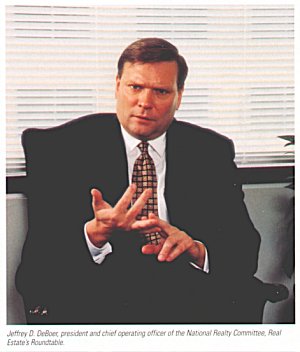 Congress Warms to D.C. Congress Warms to D.C.
Real Estate Group’s Message
This January, the 106th Congress convenes to begin what will likely be one of the most contentious sessions of Congress in recent memory. It begins amidst possible impeachment proceedings against the president and will end at the height of another major election season, in 2000. Somewhere in between, Members will likely consider legislation that will directly impact the commercial real estate industry, from a taxation, environmental, or some equally significant perspective.
When it does, expect the National Realty Committee (NRC), which also calls itself Real Estate’s Roundtable, to be in the thick of the discussions. NRC plays an important role on behalf of its constituents — America’s leading real estate owners, advisors, builders, investors, lenders and managers — in educating Members of Congress on the subtler and broader ramifications of legislative activity involving real estate property. NRC currently is assisting in the organization of a real estate caucus, where Members can informally discuss real estate matters before taking specific action in their committees.
 Jeffrey D. DeBoer (left) is president and chief operating officer of National Realty Committee, where he is responsible for implementing NRC’s strategies on national tax, capital and credit, environmental and telecommunications policies, as well as running NRC’s Washington, D.C.-based operations. A native of South Dakota, Mr. DeBoer previously held positions at the National Association of Industrial and Office Properties and the National Association of Realtors. Jeffrey D. DeBoer (left) is president and chief operating officer of National Realty Committee, where he is responsible for implementing NRC’s strategies on national tax, capital and credit, environmental and telecommunications policies, as well as running NRC’s Washington, D.C.-based operations. A native of South Dakota, Mr. DeBoer previously held positions at the National Association of Industrial and Office Properties and the National Association of Realtors.
Site Selection: Do the various NRC constituencies ever have conflicting agendas?
Jeffrey D. DeBoer: They occasionally do. This is a group of CEO-level individuals who come together with one goal in mind: the overall health of the real estate asset. Certainly, in the short term, one or more members may favor a certain policy over another, but as a group we try to look long term to determine the best solution for the asset. In terms of process, policy recommendations come from our advisory committees. Our executive committee reviews the various policy recommendations and reaches overall consensus on policies we believe would be good for real estate asset values and markets.
SS: Let’s look back at 1998. What would you say were the high points?
JDD: Number One certainly has to be the return of relative equilibrium in supply and demand in commercial real estate markets across the country. Steady growth in the public real estate debt and equity markets over the years has produced better information about factors driving real estate markets and created greater efficiencies in the availability of low-cost capital. In the end, these factors have helped leaven the natural cycles that exist in the real estate markets. That’s not to say cycles don’t exist anymore. Real estate has always been, and will continue to be, an inherently cyclical business. But it’s the capital markets’ ability to liquefy billions of dollars worth of commercial and multifamily real estate mortgages into globally traded securities that lessens the likelihood of another severe real estate credit crisis. The secondary market is already having this stabilizing effect, even with world economies in considerable turmoil today.
The real estate industry has also benefited over the past several years from a low and stable interest rate environment. Certainly, the historic agreement last year to balance the federal budget helped put the interest rate environment on a relatively stable footing.
SS: What were NRC’s key milestones in 1998, and what impact will they have on the year ahead?
JDD: Some of the key milestones are thematic rather than specific. Building on progress here in Washington for the past few years, we helped shift policymakers’ view of real estate to one that is increasingly positive. Years ago, real estate was not appreciated for the benefits to the overall economy — be it jobs, a property tax base, contributions to America’s gross domestic product or the cultural benefits from a healthy real estate market. In the past several years, particularly over the last 12 to 15 months, policymakers’ understanding and appreciation of real estate as a foundation of national and local economies has improved.
In terms of specifics this year, there have been a number of positive policy developments for commercial real estate. In the technology area, the Federal Communications Commission rejected calls by some for a federal forced access approach to wiring buildings. In doing so, the FCC acknowledged NRC’s position that proposals to regulate the rights of access for wiring or the placement of satellite dishes could have constitutional, private property rights implications. In essence, the FCC says, ‘Let’s allow the free markets to work as they were intended. Let tenants, owners and telecommunications companies decide for themselves in a market-based manner the best type of wiring or satellite product for individual properties.’ That’s been a healthy development for markets as a whole.
On the tax front, we’re very pleased that the capital gains tax was lowered last year. Some simplification provisions approved by Congress made the formation and operation of real estate investment trusts easier to understand, while some of the more technical issues facilitated operations in the public markets. This facilitated a number of transactions that might otherwise not have occurred.
We are also very interested in promoting community reinvestment, particularly through the reuse of abandoned or mildly contaminated properties in inner cities and urban areas. So far, efforts have been mostly targeted to so-called empowerment zones in inner cities. It covers such items as environmental clean-up expenses and demolition and rehabilitation of non-historic structures. I predict we’ll se more progress here in the future.
SS: How does the new real estate caucus work on Capitol Hill?
JDD: Caucuses consist of Republican and Democratic Members from both the House and the Senate — they’re open to any Member of Congress who wants to join. A caucus is usually formed around a particular issue in which a number of Members are interested. They meet informally to discuss the issue and develop policy recommendations without being confined to a particular committee’s jurisdiction on Capitol Hill. It allows a more integrated, holistic approach to issues facing various industries.
Last summer, a congressional real estate caucus was formed for the first time, co-chaired by Reps. Phil English (R.-Penn.) and Richard Neal (D.-Mass.). When the new, 106th Congress convenes in January 1999, the caucus will regroup as a separate forum in which Members can discuss real estate-related issues. One example might be environmental clean-up — an issue with direct liability concerns for prospective property buyers and sellers. If someone buys or sells a piece of property hat is contaminated, questions about who is liable for cleanup under federal and state laws come into play. But there are also tax issues related to environmental cleanup. The caucus could then examine both the environmental and tax problems of cleaning up contaminated land, issue a position paper and request comment on how best to integrate the tax and liability issues in order to obtain the best cleanup policy for our country.
SS: What will be the benefit of this group to your constituents?
JDD: The benefit comes from a more thorough discussion of the issues by policymakers without having those issues confined to specific committees of jurisdiction. A member of the tax committee may agree there should be some sort of tax incentive to cleaning up a contaminated parcel of land. But that Member of Congress might also say, ‘There’s also this purchaser liability concern, so what are you doing about that?’ The caucus would allow “one-stop shopping,” if you will, to discuss with other Members the many facets of an issue without having them say, ‘Well, that’s not in my jurisdiction.’ It provides an entry point to a more integrated discussion about policy without the constraints of a list of issues before a particular standing committee.
SS: What structure will the new caucus take?
JDD: These caucuses are somewhat informal; they meet as issues arise. We are assisting in the planning of the caucus’ first meeting in early February. Members at this event will hear more about the caucus from their colleagues as well as our thoughts on the top issues facing the real estate industry. They’ll then decide whether they would like to join the caucus. I expect, as the group evolves, we’ll see a core group of Members who are particularly interested in real estate matters meet more frequently than the overall caucus. We may never know when they meet — it may be spontaneously over a cup of coffee — but that’s good. It’s a vehicle for pulling all aspects of real estate policy issues together in what we believe will be a more holistic, informed approach to decisionmaiking by Congress.
SS: What risk management skills should NRC members have in order to succeed in today’s volatile world markets?
JDD: The current credit crunch demonstrates a need for people in real estate to understand how closely tied real estate markets are to global markets. In the past, real estate truly was a local business. You dealt with local planning commissions, local lenders and local ordinances. While that continues to be the case, today’s real estate executive must also understand the tie that their local project has to global markets and the role securitization of real estate debt and equity plays in those markets.
SS: Any thoughts on what impact, if any, the turmoil in the hedge fund marketplace will have on global commercial real estate?
JDD: Because hedge funds are an unregulated industry, the highly publicized recent losses by prominent fund managers — which clearly affected capital markets as a whole — could cause the congressional banking committees to consider regulating or overseeing hedge

fund operations. In some cases, hedge funds do invest in lower-rated B tranches of commercial mortgage-backed securities, and I expect Congress will closely examine the use of these securities in hearings in 1999. We could also see some effort to pull these funds into the overall financial services modernization arena.
SS
Get the whole story and much more!
Subscribe to Site Selection Magazine

| This Issue | Site Selection Online | SiteNet |
Feedback |
GeoSearch |
©1998 Conway Data, Inc. All rights reserved. SiteNet data is from many sources and is not warranted to be accurate or current.
|  Congress Warms to D.C.
Congress Warms to D.C.

 JANUARY 1999
JANUARY 1999 Jeffrey D. DeBoer (left) is president and chief operating officer of National Realty Committee, where he is responsible for implementing NRC’s strategies on national tax, capital and credit, environmental and telecommunications policies, as well as running NRC’s Washington, D.C.-based operations. A native of South Dakota, Mr. DeBoer previously held positions at the National Association of Industrial and Office Properties and the National Association of Realtors.
Jeffrey D. DeBoer (left) is president and chief operating officer of National Realty Committee, where he is responsible for implementing NRC’s strategies on national tax, capital and credit, environmental and telecommunications policies, as well as running NRC’s Washington, D.C.-based operations. A native of South Dakota, Mr. DeBoer previously held positions at the National Association of Industrial and Office Properties and the National Association of Realtors. 